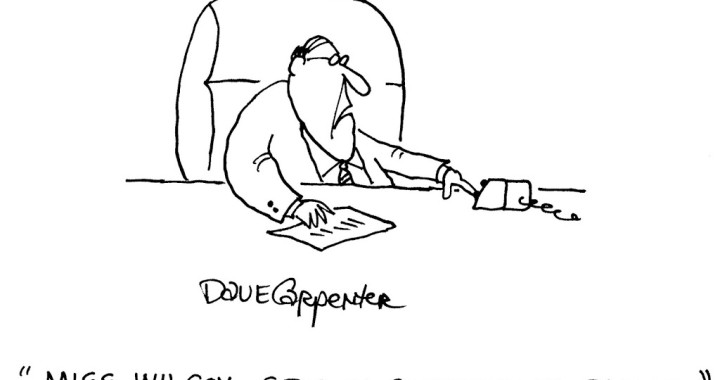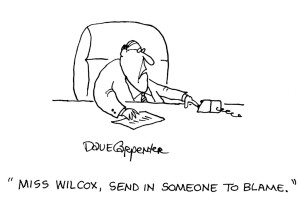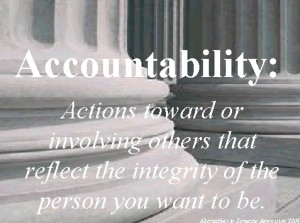As I said a few weeks back the team at Ultimate Youth Worker are currently developing our “Model of Effective Youth Work Practice“, which will guide how we work as youth workers and how we teach youth work to those in the industry. We are creating this guide for the development of practice excellence for youth workers as a step towards framing good ethical practice that every youth worker can do…not just those with a qualification. Our first pillar of successful youth work that we hold to is that of reflective practice. Our Second pillar of successful youth work is Accountability.
Accountability has gained a bad name in the human services sector particularly over the years that the neo-managerialist approach has entered the fray. Many of us have felt the prying eyes of government agencies and funding bodies who seek to impose their ideologies and boundaries on us and our services whilst asking us to do more. We have seen our supervisors change from reflective supervisors to hamstrung managers. We have seen our multitude of practices being whittled down to be pigeon holed in best practice manuals and funding agreements.
Accountability in our eyes is not the boss hanging over your shoulder making sure you follow the company line. Accountability is a set of checks and balances designed to support you as a person, your practice, your clients and your longevity in the field. Accountability means being open to many people. Your boss, your organisation, your clients, your husband/wife/partner, your supervisor, your mentors etc. Accountability is the glue which holds your goals together and brings focus for the future.
One of the best pieces of accountability I have ever had was initially imposed on me and is now one I can’t do without. In the early days of my career a really switched on youth minister mate of mine said I should get a mentor. Someone outside of the work I do but who understands the sector. Someone that i can vent to, ask for advice and who will make sure I keep some balance in my life. The guy who mentors me knows more about me than almost anyone else and isn’t afraid to tell me how it is. Do you have a mentor??? If not get one!
Over this past weekend myself and two other seasoned youth workers began a think tank support group for a young youth minister in Melbourne. We spent an afternoon together getting to know each other and hearing her vision for the local community she is working in. We asked her to become accountable to a process of ongoing support and development where we will push her to become the best she can be. Accountability in this situation means trusting a group of people from different areas of practice to guide her through strength and weakness to develop her skills to support her community.
Not all of us have great bosses and even more importantly good supervisors. This does make it hard to trust them with accountability. However to have balance at work we must be transparent and accountable. There may be time when we need to be ‘Canny Outlaws’ however we must also work within the systems we find ourselves in. If your boss or supervisor isn’t open to accountability that is more than managerialism ask them to help you. If they still aren’t there DO IT YOURSELF!!! Start a small reflective practice group. Develop your own practical wisdom. Find a mentor. Get external supervision. try, try, try. Be open to managerialism but do not let that be the benchmark, SEEK EXCELLENCE.
Being accountable means being open to people probing your practice as well as your person. Just this week my supervisor asked me to think about how my personality (which can be a dominant one) comes across in meetings and service delivery. I didn’t like having my person stripped bare but I accepted the criticism and actively sought out discussion with colleagues and mentors on how I can work on this. Being accountable means being active. You cant say you are willing to work on your practice and person and then kick up a stink when people call you on it.
Being accountable has many facets and more discussion is necessary. Be aware of your limitations and the boundaries which are imposed on you. Be the best you can be and don’t be afraid to open your practice and your person up to ongoing development. Accountability is what sets apart great youth workers and those we all roll our eyes over.
If you have any questions drop us an email or chat to us on facebook and twitter.








Pingback: Accountability through ongoing learning | Ultimate Youth Worker
Pingback: Top 5 blog posts of the first twelve months of Ultimate Youth Worker. - Ultimate Youth Worker
Pingback: What is a youth workers Duty of Care: Reporting abuse - Ultimate Youth Worker
Pingback: youth work peer consultation: reflective practice revisited - Ultimate Youth Worker
Pingback: Observe the C in DISC for youth worker's - Ultimate Youth Worker